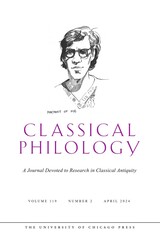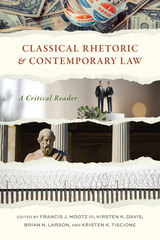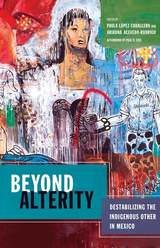
Although previous studies have usually focused on the most visible aspects of differences—cosmovision, language, customs, resistance—the contributors to this volume show that emphasizing difference prevents researchers from seeing all the social phenomena where alterity is not obvious. Those phenomena are equally or even more constitutive of social life and include property relations (especially individual or private ones), participation in national projects, and the use of national languages.
The category of “indigenous” has commonly been used as if it were an objective term referring to an already given social subject. Beyond Alterity shows how this usage overlooks the fact that the social markers of differentiation (language, race or ethnic group, phenotype) are historical and therefore unstable. In opposition to any reification of geographical, cultural, or social boundaries, this volume shows that people who (self-)identify as indigenous share a multitude of practices with the rest of society and that the association between indigenous identification and alterity is the product of a specific political history.
Beyond Alterity is essential reading for anyone interested in understanding indigenous identity, race, and Mexican history and politics.
Contributors
Ariadna Acevedo-Rodrigo
Laura Cházaro
Michael T. Ducey
Paul K. Eiss
José Luis Escalona-Victoria
Vivette García Deister
Peter Guardino
Emilio Kourí
Paula López Caballero
Elsie Rockwell
Diana Lynn Schwartz
Gabriela Torres-Mazuera
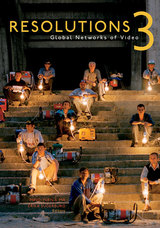
Resolutions 3 explores the wide-ranging implications of video art and video-based production in contemporary media culture. It is the third volume in a series composed of Resolution: A Critique of Video Art (1986) and Resolutions: Contemporary Video Practices (1996). While Resolution was one of the first critical texts on video art in the United States, Resolutions was one of the first books to address video as a medium across disciplines from theoretical, activist, and transnational perspectives.
Resolutions 3 articulates this legacy as a challenge to reengage with the explosive viral reach of moving image–based content and its infiltration into and impact on culture and everyday life. The contributors to this work analyze what is now a fourth decade of video practices as marked within and outside the margins of art production, networked interventions, projected spectacle, museum entombment, or 24/7 streaming. Intending to broaden, contest, and amplify the mediated space that was defined by its two predecessors, this volume investigates the ever-changing state of video’s deployment as examiner, tool, journal reportage, improvisation, witness, riff, leverage, and document.
Contributors: Kathleen Ash-Milby, Smithsonian National Museum of the American Indian; Myriam-Odile Blin, Rouen U, France; Nancy Buchanan, California Institute of the Arts; Derek A. Burrill, U of California, Riverside; Sean Cubitt, U of Melbourne; Faisal Devji, New York U; Jennifer Doyle, U of California, Riverside; Jennifer Friedlander, Pomona College; Kathy High, Rensselaer Polytechnic Institute; Lucas Hilderbrand, U of California, Irvine; Nguyen Tan Hoang, Bryn Mawr College; Kathy Rae Huffman; Amelia Jones, McGill U; David Joselit, Yale U; Alexandra Juhasz, Pitzer College; Jessica Lawless, Santa Fe Community College; Hea Jeong Lee; Jesse Lerner, Pitzer College; Akira Mizuta Lippit, U of Southern California; Lionel Manga; Laurence A. Rickels, U of California, Santa Barbara; Kenneth Rogers, U of California, Riverside; Michael Rush, Eli and Edythe Broad Art Museum, Michigan State U; Freya Schiwy, U of California, Riverside; Beverly R. Singer, U of New Mexico; Yvonne Spielmann, U of the West of Scotland; Catherine Taft, Getty Research Institute; Holly Willis, U of Southern California.
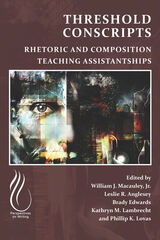
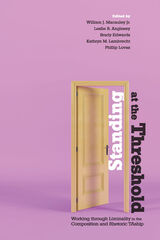
These authors enrich the TA experience by supporting agency and self-efficacy, encouraging TAs to take active roles in understanding their positions and making the most of that experience. Many chapters are written by current or former TAs who are writing as a means of preparing, informing, and guiding new rhet/comp TAs, encouraging them to make choices about how they want to think through and participate in their teaching work.
The first work on the market to delve deeply into the TAship itself and what it means for the larger discipline, Standing at the Threshold provides a rich new theorizing based in the real experiences and liminalities of teaching assistants in composition and rhetoric, approached from a productive array of perspectives.
Contributors: Lew Caccia, Lillian Campbell, Rachel Donegan, Jaclyn Fiscus-Cannady, Jennifer K. Johnson, Ronda Leathers Dively, Faith Matzker, Jessica Restaino, Elizabeth Saur, Megan Schoettler, Kylee Thacker Maurer
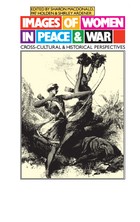
As warriors, freedom fighters and victims, as mothers, wives and prostitutes, and as creators and members of peace movements, women are inevitably caught up in the net of war. Yet women’s participation in warfare and peace campaigns has often been underestimated or ignored.
Images of Women in Peace and War explores women’s relationships to war, peace, and revolution, from the Amazons, Inka and Boadicea, to women soldiers in South Africa, Mau Mau freedom fighters and the protestors at Greenham Common. The contributors consider not only the reality of women’s participation but also look at how their actions have been perceived and represented across cultures and through history. They examine how sexual imagery is constructed, how it is used to delineate women’s relation to warfare and how these images have sometimes been subverted in order to challenge the status quo. The book raises important questions about whether women have a special prerogative to promote peace and considers whether the experience of motherhood leads to a distinctive women’s position on war. The authors find that their analyses lead them to deal with arguments on the basic nature of the sexes and to reevaluate our concepts of “peace,” “war,” and “gender.”
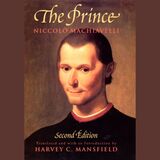
The most famous book on politics ever written, The Prince remains as lively and shocking today as when it was written almost five hundred years ago. Initially denounced as a collection of sinister maxims and a recommendation of tyranny, it has more recently been defended as the first scientific treatment of politics as it is practiced rather than as it ought to be practiced. Harvey C. Mansfield's brilliant translation of this classic work, along with the new materials added for this edition, make it the definitive version of The Prince, indispensable to scholars, students, and those interested in the dark art of politics.
This revised edition of Mansfield's acclaimed translation features an updated bibliography, a substantial glossary, an analytic introduction, a chronology of Machiavelli's life, and a map of Italy in Machiavelli's time.
"Of the other available [translations], that of Harvey C. Mansfield makes the necessary compromises between exactness and readability, as well as providing an excellent introduction and notes."—Clifford Orwin, The Wall Street Journal
"Mansfield's work . . . is worth acquiring as the best combination of accuracy and readability."—Choice
"There is good reason to assert that Machiavelli has met his match in Mansfield. . . . [He] is ready to read Machiavelli as he demands to be read—plainly and boldly, but also cautiously."—John Gueguen, The Sixteenth Century Journal
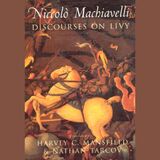
"[Machiavelli] found in Livy the means to inspire scholars for five centuries. Within the Discourses, often hidden and sometimes unintended by their author, lie the seeds of modern political thought. . . . [Mansfield and Tarcov's] translation is careful and idiomatic."—Peter Stothard, The Times
"Translated with painstaking accuracy—but also great readability."—Weekly Standard
"A model of contemporary scholarship and a brave effort at Machiavelli translation that allows the great Florentine to speak in his own voice."—Choice
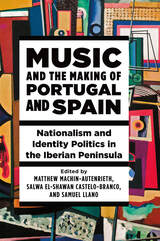
What does music in Portugal and Spain reveal about the relationship between national and regional identity building? How do various actors use music to advance nationalism? How have state and international heritage regimes contributed to nationalist and regionalist projects? In this collection, contributors explore these and other essential questions from a range of interdisciplinary vantage points. The essays pay particular attention to the role played by the state in deciding what music represents Portuguese or Spanish identity. Case studies examine many aspects of the issue, including local recording networks, so-called national style in popular music, and music’s role in both political protest and heritage regimes. Topics include the ways the Salazar and Franco regimes adapted music to align with their ideological agendas; the twenty-first-century impact of UNESCO’s Intangible Cultural Heritage program on some of Portugal and Spain's expressive practices; and the tensions that arise between institutions and community in creating and recreating meanings and identity around music.
Contributors: Ricardo Andrade, Vera Marques Alves, Salwa El-Shawan Castelo-Branco, Cristina Sánchez-Carretero, José Hugo Pires Castro, Paulo Ferreira de Castro, Fernán del Val, Héctor Fouce, Diego García-Peinazo, Leonor Losa, Josep Martí, Eva Moreda Rodríguez, Pedro Russo Moreira, Cristina Cruces Roldán, and Igor Contreras Zubillaga
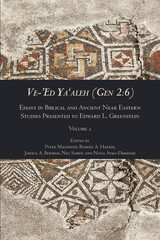
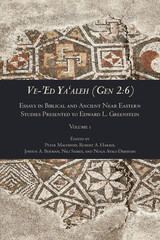
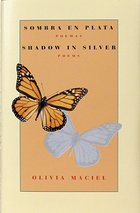
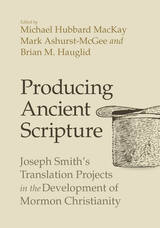
This collaborative volume is the first to study Joseph Smith’s translation projects in their entirety. In this carefully curated collection, experts contribute cutting-edge research and incisive analysis. The chapters explore Smith’s translation projects in focused detail and in broad contexts, as well as in comparison and conversation with one another. Authors approach Smith’s sacred texts historically, textually, linguistically, and literarily to offer a multidisciplinary view. Scrupulous examination of the production and content of Smith’s translations opens new avenues for understanding the foundations of Mormonism, provides insight on aspects of early American religious culture, and helps conceptualize the production and transmission of sacred texts.
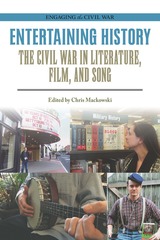
From Ulysses S. Grant’s Memoirs to Abraham Lincoln: Vampire Hunter, from Roots to Ken Burns’s The Civil War, from “Dixie” to “Ashokan Farewell,” and from Civil War photography to the Gettysburg Cyclorama, trendy and well-loved depictions of the Civil War are the subjects of twenty contributors who tell how they and the general public have been influenced by them. Sarah Kay Bierle examines the eternal appeal of Gone with the Wind and asks how it is that a protagonist who so opposed the war has become such a figurehead for it. H. R. Gordon talks with New York Times–bestselling novelist Jeff Shaara to discuss the power of storytelling. Paul Ashdown explores ColdMountain’s value as a portrait of the war as national upheaval, and Kevin Pawlak traces a shift in cinema’s depiction of slavery epitomized by 12 Years a Slave. Tony Horwitz revisits his iconic Confederates in the Attic twenty years later.
The contributors’ fresh analysis articulates a shared passion for history’s representation in the popular media. The variety of voices and topics in this collection coalesces into a fascinating discussion of some of the most popular texts in the genres. In keeping with the innovative nature of this series, web-exclusive material extends the conversation beyond the book.

Taking advantage of documents never before available from the archives of the East German Communist Party and the Ministry for State Security, and drawing on interviews with, among others, the legendary spy chief Markus Wolf and members of the East German Politburo, Science under Socialism is the first book to examine the role of science and technology in the former German Democratic Republic. The result is a multi-layered analysis of the scientific enterprise that provides a fascinating glimpse into what it took to construct a new socialist state and the role science and technology played in it.
The book is organized around general policy issues, institutions, disciplines, and biographies. An international cast of contributors (Americans, former East Germans, and former West Germans) take the reader on a journey from the view of science policymakers, to the construction of "socialist" institutions for science, to the role of espionage in technology transfer, to the social and political context of the chemical industry, engineers, nuclear power, biology, computers, and finally the career trajectories of scientists through the vicissitudes of twentieth-century German history.
By providing a historical understanding of the scientific enterprise in East Germany, Science under Socialism also offers the fullest account we have of the effect of state socialism on the development of science.

In more ways than we may sometimes care to acknowledge, the human being is just another primate--it is certainly only very rarely that researchers into cognition, emotion, personality, and behavior in our species and in other primates come together to compare notes and share insights. This book, one of the few comprehensive attempts at integrating behavioral research into human and nonhuman primates, does precisely that--and in doing so, offers a clear, in-depth look at the mutually enlightening work being done in psychology and primatology.
Relying on theories of behavior derived from psychology rather than ecology or biological anthropology, the authors, internationally known experts in primatology and psychology, focus primarily on social processes in areas including aggression, conflict resolution, sexuality, attachment, parenting, social development and affiliation, cognitive development, social cognition, personality, emotions, vocal and nonvocal communication, cognitive neuroscience, and psychopathology. They show nonhuman primates to be far more complex, cognitively and emotionally, than was once supposed, with provocative implications for our understanding of supposedly unique human characteristics. Arguing that both human and nonhuman primates are distinctive for their wide range of context-sensitive behaviors, their work makes a powerful case for the future integration of human and primate behavioral research.
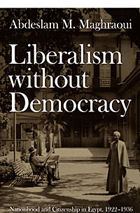
In the 1920s and 1930s, Egypt’s reformers equated liberal notions of nationhood and citizenship with European civilization and culture. As Maghraoui demonstrates, in their efforts to achieve liberalization, they sought to align Egypt with the West and to dissociate it from the Arab and Islamic worlds. Egypt’s professionals and leading cultural figures attempted to replace the fez with European-style hats; they discouraged literary critics from studying Arabic poetry, claiming it was alien to Egyptian culture. Why did they feel compelled to degrade local cultures in order to accommodate liberal principles?
Drawing on the thought of Lacan, Fanon, Said, and Bhabha, as well as contemporary political theory, Maghraoui points to liberalism’s inherent contradiction: its simultaneous commitments to individual liberty and colonial conquest. He argues that when Egypt’s reformers embraced the language of liberalism as their own, they adopted social prejudices built into that language. Efforts to achieve liberalization played out—and failed—within the realm of culture, not just within the political arena. Opinions voiced through literary works, cartoons, newspaper articles on controversial social issues, and other forms of cultural expression were ultimately more important to the fate of liberalism in Egypt than were questions of formal political participation and representation. Liberalism without Democracy demonstrates the powerful—and under appreciated—role of language and culture in defining citizenship and political community.

Two ill-fated rhetoricians.
Antiphon of Athens, born in 480 BC, spent his prime in the great period of Athens but, disliking democracy, was himself an ardent oligarch who with others set up a violent short-lived oligarchy in 411. The restored democracy executed him for treason. He had been a writer of speeches for other people involved in litigation. Of the fifteen surviving works three concern real murder cases. The others are exercises in speechcraft consisting of three tetralogies, each tetralogy comprising four skeleton speeches: accuser’s; defendant’s; accuser’s reply; defendant’s counter-reply.
Andocides of Athens, born ca. 440 BC, disliked the extremes of both democracy and oligarchy. Involved in religious scandal in 415 BC, he went into exile. After at least two efforts to return, he did so under the amnesty of 403. In 399 he was acquitted on a charge of profaning the Mysteries and in 391–390 took part in an abortive peace embassy to Sparta. Extant speeches are: On His Return (a plea on his second attempt); On the Mysteries (a self-defense); On the Peace with Sparta. The speech Against Alcibiades (the notorious politician) is suspect.
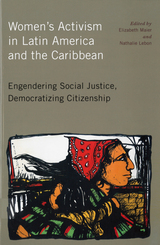

This richly illustrated volume tells the story of thehome that has served as Ohio’s executive residence since 1957, and of the nine governors and their families who have lived in the house. Our First Family’s Home offers the first complete history of the residence and garden that represent Ohio to visiting dignitaries and the citizens of the state alike. Once in a state of decline, the house has been lovingly restored and improved by itsresidents. Development of the Ohio Heritage Garden has increased the educational potential of the house and has sparked an interest in the preservation of native plant species. Looking toward the future, the Residence is also taking the lead in promoting environmental issues such as solar powerand green energy.
Photographs by award-winning environmental photographer Ian Adams and botanical art by Dianne McElwain showcase the beauty of the home’s architecture and the myriad of native plants that grace the three acres on which the Residence stands. Dianne McElwain is a member of the American Society of Botanical Artists in New York. Her botanical paintings have won numerous awards and are found in prestigious collections throughout the United States.
Essays highlight the Jacobethan Revival architecture and the history of the home. The remaining pieces cover the garden and include an intimate tour of the Heritage Garden, which was inspired by Ohio’s diverse landscape. Finally, former Governor Ted Strickland and First Lady Frances Strickland discuss the increasing focus on green energy at the Governor’s Residence and First Lady Emerita Hope Taft explains how native plants can help sustain the environment.
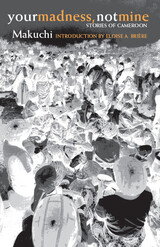
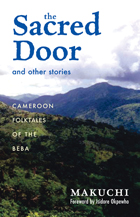

Transnational Actors in War and Peace provides a comparative examination of a range of transnational actors who have been key to the conduct of war and peace promotion, and of how they interact with states and each other. It explores the identities, organization, strategies and influence of transnational actors involved in contentious politics, armed conflict, and peacemaking.
While the study of transnational politics has been a rapidly growing field, to date, the disparate actors have not been analyzed alongside each other, making it difficult to develop a common theoretical framework or determine their influence on international security. This book brings together a diverse set of scholars focused on a range of transnational actors, such as: foreign fighters, terrorists, private military security companies, religious groups, diasporas, NGOs, and women’s peace groups. Malet and Anderson provide the standard for future study of transnational actors in this work intended for those interested in security studies, international relations, conflict resolution, and global governance.

This book is a study of the variable perceptions of Greek collective identity, discussing ancient categories such as blood- and mythically-related primordiality, language, religion, and culture. With less emphasis on dichotomies between Greeks and others, the book considers complex middle grounds of intra-Hellenic perceptions, oppositional identities, and outsiders’ views. Although the authors do not seek to provide a litmus test of Greek identity, they do pay close attention to modern theories of ethnicity, its construction, function, and representation, and assess their applicability to views of Greekness in antiquity.
From the Archaic period through the Roman Empire, archaeological, anthropological, historical, historiographical, rhetorical, artistic, and literary aspects are studied. Regardless of the invented aspects of ethnicity, the book illustrates its force and validity in history.
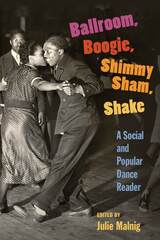
This dynamic collection documents the rich and varied history of social dance and the multiple styles it has generated, while drawing on some of the most current forms of critical and theoretical inquiry. The essays cover different historical periods and styles; encompass regional influences from North and South America, Britain, Europe, and Africa; and emphasize a variety of methodological approaches, including ethnography, anthropology, gender studies, and critical race theory. While social dance is defined primarily as dance performed by the public in ballrooms, clubs, dance halls, and other meeting spots, contributors also examine social dance’s symbiotic relationship with popular, theatrical stage dance forms.
Contributors are Elizabeth Aldrich, Barbara Cohen-Stratyner, Yvonne Daniel, Sherril Dodds, Lisa Doolittle, David F. García, Nadine George-Graves, Jurretta Jordan Heckscher, Constance Valis Hill, Karen W. Hubbard, Tim Lawrence, Julie Malnig, Carol Martin, Juliet McMains, Terry Monaghan, Halifu Osumare, Sally R. Sommer, May Gwin Waggoner, Tim Wall, and Christina Zanfagna.
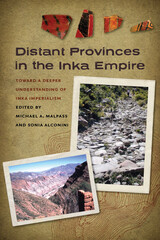
Who was in charge of the widespread provinces of the great Inka Empire of the fifteenth and sixteenth centuries: Inka from the imperial heartland or local leaders who took on the trappings of their conquerors, either by coercion or acceptance? By focusing on provinces far from the capital of Cuzco, the essays in this multidisciplinary volume provide up-to-date information on the strategies of domination asserted by the Inka across the provinces far from their capital and the equally broad range of responses adopted by their conquered peoples.
Contributors to this cutting-edge volume incorporate the interaction of archaeological and ethnohistorical research with archaeobotany, biometrics, architecture, and mining engineering, among other fields. The geographical scope of the chapters—which cover the Inka provinces in Bolivia, in southeast Argentina, in southern Chile, along the central and north coast of Peru, and in Ecuador—build upon the many different ways in which conqueror and conquered interacted. Competing factors such as the kinds of resources available in the provinces, the degree of cooperation or resistance manifested by local leaders, the existing levels of political organization convenient to the imperial administration, and how recently a region had been conquered provide a wealth of information on regions previously understudied. Using detailed contextual analyses of Inka and elite residences and settlements in the distant provinces, the essayists evaluate the impact of the empire on the leadership strategies of conquered populations, whether they were Inka by privilege, local leaders acculturated to Inka norms, or foreign mid-level administrators from trusted ethnicities.
By exploring the critical interface between local elites and their Inka overlords, Distant Provinces in the Inka Empire builds upon Malpass’s 1993 Provincial Inca: Archaeological and Ethnohistorical Assessment of the Impact of the Inca State to support the conclusions that Inka strategies of control were tailored to the particular situations faced in different regions. By contributing to our understanding of what it means to be marginal in the Inka Empire, this book details how the Inka attended to their political and economic goals in their interactions with their conquered peoples and how their subjects responded, producing a richly textured view of the reality that was the Inka Empire.

This is the first book to examine challenges in the healthcare sector in the six Gulf Cooperation Council (GCC) countries (Saudi Arabia, Oman, the United Arab Emirates, Qatar, Kuwait, and Bahrain). These countries experienced remarkably swift transformations from small fishing and pearling communities at the beginning of the twentieth century to wealthy petro-states today. Their healthcare systems, however, are only now beginning to catch up.
Rapid changes to the population and lifestyles of the GCC states have completely changed—and challenged—the region’s health profile and infrastructure. While major successes in combatting infectious diseases and improving standards of primary healthcare are reflected in key health indicators, new trends have developed; increasingly “lifestyle” or “wealthy country” diseases, such as diabetes, heart disease, and cancer, have replaced the old maladies. To meet these emerging healthcare needs, GCC states require highly trained and skilled healthcare workers, an environment that supports local training, state-of-the-art diagnostic laboratories and hospitals, research production and dissemination, and knowledge acquisition. They face shortages in most if not all of these areas. This book provides a comprehensive study of the rapidly changing health profile of the region, the existing conditions of healthcare systems, and the challenges posed to healthcare management across the six states of the GCC.
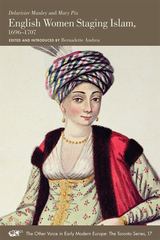
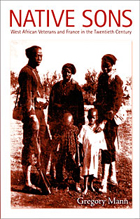
Focusing on the period between World War I and 1968, Mann draws on archival research and extensive interviews with surviving Malian veterans of French wars to explore the experiences of the African soldiers. He describes the effects their long absences and infrequent homecomings had on these men and their communities, he considers the veterans’ status within contemporary Malian society, and he examines their efforts to claim recognition and pensions from France. Mann contends that Mali is as much a postslavery society as it is a postcolonial one, and that specific ideas about reciprocity, mutual obligation, and uneven exchange that had developed during the era of slavery remain influential today, informing Malians’ conviction that France owes them a “blood debt” for the military service of African soldiers in French wars.

Just 30 minutes a day of moderate exercise--even walking--can save your life. This is the powerful message that Dr. JoAnn Manson--of the lead investigators of both the Women's Health Initiative and the Nurses' Health Study--and her coauthor Patricia Amend want to send to American women.
Regardless of the barriers you may face--too busy, too tired, too "down," or too old--with this four-step practical plan you'll find the excuses falling away and a happier, healthier self emerging. This book offers not only state-of-the-art information from recent medical research but step-by-step instructions on how to get started and maintain a physically active lifestyle. The authors will help you choose a "core" activity that doesn't disrupt your daily life. Then they will show you how to measure your fitness level at the start, how to monitor your progress over time, and how to reward yourself for your efforts. These four simple steps to fitness will work no matter who you are--25 or 75, harried mother or overworked professional (or both), in good health or living with a chronic disease.
The authors have included a clearly illustrated program of stretching and strength-training exercises; sensible activities for women with health concerns; an intelligent weight-loss plan; guidelines for selecting home exercise equipment and choosing a health club; and much more. With over 100 illustrations, questionnaires, and checklists, this book has everything you need to feel good, look better, and live longer, starting today--it's all just 30 minutes away.

Maparyan organizes the contributions around five key ideas. The first section looks at womanist self-care as a life-saving strategy. The second examines healing the Earth as a prerequisite to healing ourselves. In Part Three, the essays illuminate how womanism’s politics of invitation provides a strategy for enlarging humanity’s circle of inclusion, while Part Four considers womanism as both a challenge and antidote to dehumanization. The final section delves into womanism’s potential for constructing worlds and futures. In addition, Maparyan includes a section of works by womanist visual artists.
Defiant and far-sighted, Womanism Rising takes readers on a journey into a new generation of concepts, ideas, and strategies for womanist studies.
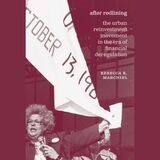
Focusing on Chicago's West Side, After Redlining illuminates how urban activists were able to change banks’ behavior to support investment in communities that they had once abandoned.
American banks, to their eternal discredit, long played a key role in disenfranchising nonwhite urbanites and, through redlining, blighting the very city neighborhoods that needed the most investment. Banks long showed little compunction in aiding and abetting blockbusting, discrimination, and outright theft from nonwhites. They denied funds to entire neighborhoods or actively exploited them, to the benefit of suburban whites—an economic white flight to sharpen the pain caused by the demographic one.
And yet, the dynamic between banks and urban communities was not static, and positive urban development, supported by banks, became possible. In After Redlining, Rebecca K. Marchiel illuminates how, exactly, urban activists were able to change some banks’ behavior to support investment in communities that they had once abandoned. The leading activists arose in an area hit hard by banks’ discriminatory actions and politics: Chicago’s West Side. A multiracial coalition of low- and moderate-income city residents, this Saul Alinsky–inspired group championed urban reinvestment. And amazingly, it worked: their efforts inspired national action, culminating in the federal Home Mortgage Disclosure Act and the Community Reinvestment Act.
While the battle for urban equity goes on, After Redlining provides a blueprint of hope.
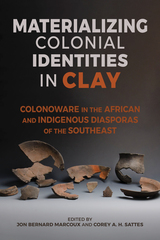
Colonoware was most likely produced by African and Indigenous potters and used by all colonial groups for cooking, serving, and storing food. It formed the foundation of colonial foodways in many settlements across the southeastern United States. Even so, compared with other ceramics from this period, less has been understood about its production and use because of the lack of documentation. This collection of essays fills this gap with valuable, recent archaeological data from which much may be surmised about the interaction among Europeans, Indigenous, and Africans, especially within the contexts of the African and Indigenous slave trade and plantation systems.
The chapters represent the full range of colonoware research: from the beginning to the end of its production, from urban to rural contexts, and from its intraregional variation in the Lowcountry to the broad patterns of colonialism across the early American Southeast. The book summarizes current approaches in colonoware research and how these may bridge the gaps between broader colonial American studies, Indigenous studies, and African Diaspora studies.
A concluding discussion contextualizes the chapters through the perspectives of intersectionality and Black feminist theory, drawing attention to the gendered and racialized meanings embodied in colonoware, and considering how colonialism and slavery have shaped these cultural dimensions and archaeologists’ study of them.
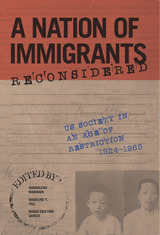
Contributors: Eiichiro Azuma, David Cook-Martín, David FitzGerald, Monique Laney, Heather Lee, Kathleen López, Laura Madokoro, Ronald L. Mize, Arissa H. Oh, Ana Elizabeth Rosas, Lorrin Thomas, Ruth Ellen Wasem, and Elliott Young
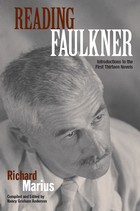
An expository treatment of Faulkner's major works, Reading Faulkner comprises essays that are arranged in roughly chronological order, corresponding to Faulkner's development as a writer. In a way sure to captivate the imagination of a new reader of Faulkner, Marius explicates themes in Faulkner's work, and he sheds light on the larger social history that marked Faulkner's literary production.
In addition, Marius is a southerner who grew up a couple of generations after Faulkner and, like Faulkner, turned his own world into the setting for his fiction. This unique perspective, combined with Marius's thorough readings of the novels, grounded in basic Faulkner criticism, provides an engaging and accessible self-guided tour through Faulkner's career.
Reading Faulkner is perfect for students from high school through the undergraduate level and will be enjoyed by general readers as well.
Richard Marius (1933-1999) taught at the University of Tennessee before heading Harvard's expository writing program from 1978 to 1998. He was the author of Thomas More, Martin Luther: The Christian between God and Death, and four novels about his native East Tennessee.
Nancy Grisham Anderson is an associate professor of English at Auburn University, Montgomery. She is the author of The Writer's Audience: A Reader for Composition and the editor of They Call Me Kay: A Courtship in Letters, and Wrestling with God: The Meditations of Richard Marius. She was a longtime friend of Richard Marius.
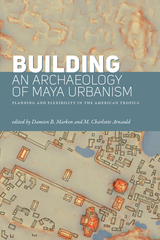
Integrating recent lidar survey data with more traditional excavation and artifact-based archaeological practices, chapters in this volume offer broadened perspectives on the patterns of Maya urban design and planning by viewing bottom-up and self-organizing processes as integral to the form, development, and dissolution of Classic lowland cities alongside potentially centralized civic designs. Full of innovative examples of how to build an archaeology of urbanism that can be applied not just to the lowland Maya and across the region, Building an Archaeology of Maya Urbanism simultaneously improves interpretations of lowland Maya culture history and contributes to empirical and comparative discussions of tropical, non-Western cities worldwide.
Contributors: Divina Perla Barrera, Arianna Campiani, Cyril Castanet, Adrian S. Z. Chase, Lydie Dussol, Sara Dzul Góngora, Keith Eppich, Thomas Garrison, María Rocio González de la Mata, Timothy Hare, Julien Hiquet, Takeshi Inomata, Eva Lemonnier, José Francisco Osorio León, Marilyn Masson, Elsa Damaris Menéndez, Timothy Murtha, Philippe Nondédéo, Keith M. Prufer, Louise Purdue, Francisco Pérez Ruíz, Julien Sion, Travis Stanton, Rodrigo Liendo Stuardo, Karl A. Taube, Marc Testé, Amy E. Thompson, Daniela Triadan
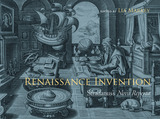
Renaissance Invention: Stradanus’s “Nova Reperta” seeks to understand why certain inventions or novelties were represented in the series and how that presentation reflected and fostered their adoption in the sixteenth century. What can Stradanus’s prints tell us about invention and cross-cultural encounter in the Renaissance? What was considered “new” in the era? Who created change and technological innovation?
Through images of group activities and interactions in workshops, Stradanus’s prints emphasize the importance of collaboration in the creation of new things, dispelling traditional notions of individual genius. The series also dismisses the assumption that the revival of the wonders of the ancient world in Italy was the catalyst for transformation. In fact, the Latin captions on the prints explain how contemporary inventions surpass those of the ancients. Together, word and image foreground the global nature of invention and change in the early modern period even as they promote specifically Florentine interests and activities.

The typical female sports fan remains very different from her male counterparts. In their insightful and engaging book, Sportista, Andrei S. Markovits and Emily Albertson examine the significant ways many women have become fully conversant with sports—acquiring a knowledge of and passion for them as a way of forging identities that until recently were quite alien to women.
Sportista chronicles the relationship that women have developed with sports in the wake of the second wave of feminism of the late 1960s and early 1970s. The changes women athletes have achieved have been nothing short of revolutionary. But, as Markovits and Albertson argue, women’s identities as sports fans, though also changed in recent decades, remain notably different from that of men. Sportista highlights the impediments to these changes that women have faced and the reality that, even as bona fide fans, they “speak” sports differently from and remain largely unaccepted by men.
In the series Politics, History and Social Change, edited by John C. Torpey

Sex, Sexuality, and the Anthropologist recounts the real-life experiences of anthropologists who are forced to acknowledge that their hosts in the field view them as gendered beings in a social context, not as asexual, objective observers. Far from controlling the research environment and defining the terms of interviewer-informant relationships, these researchers find they must engage in a process of negotiating their position—including their sexual position—within the communities they study.
Ranging from public baths in Austria to lesbian bars in Taiwan and from Mexico to Nigeria to Finland to Japan, Sex, Sexuality, and the Anthropologist raises critical questions about ethnographers' reflexivity, subjectivity, and detachment, confronting the challenge of a holistic approach to the anthropological enterprise.
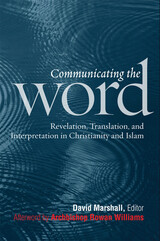
Communicating the Word is a record of the 2008 Building Bridges seminar, an annual dialogue between leading Christian and Muslim scholars convened by the Archbishop of Canterbury. Featuring the insights of internationally known Christian and Muslim scholars, the essays collected here focus attention on key scriptural texts but also engage with both classical and contemporary Islamic and Christian thought. Issues addressed include, among others, the different ways in which Christians and Muslims think of their scriptures as the “Word of God,” the possibilities and challenges of translating scripture, and the methods—and conflicts—involved in interpreting scripture in the past and today.
In his concluding reflections, Archbishop Rowan Williams draws attention to a fundamental point emerging from these fascinating contributions: “Islam and Christianity alike give a high valuation to the conviction that God speaks to us. Grasping what that does and does not mean . . . is challenging theological work.”
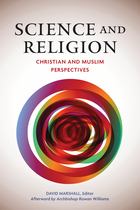
Science and Religion is a record of the 2009 Building Bridges seminar, a dialogue between leading Christian and Muslim scholars convened annually by the Archbishop of Canterbury. The essays in this volume explore how both faith traditions have approached the interface between science and religion and throw light on the ongoing challenges posed by this issue today. The volume includes a selection of relevant texts together with commentary that illuminates the scriptures, the ideas of key religious thinkers, and also the legacy of Charles Darwin.
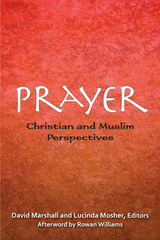
Prayer: Christian and Muslim Perspectives is a rich collection of essays, scriptural texts, and personal reflections featuring leading scholars analyzing the meaning and function of prayer within their traditions. Drawn from the 2011 Building Bridges seminar in Doha, Qatar, the essays in this volume explore the devotional practices of each tradition and how these practices are taught and learned. Relevant texts are included, with commentary, as are personal reflections on prayer by each of the seminar participants. The volume also contains a Christian reflection on Islamic prayer and a Muslim reflection on Christian prayer. An extensive account of the informal conversations at the seminar conveys a vivid sense of the lively, penetrating, but respectful dialogue that took place.
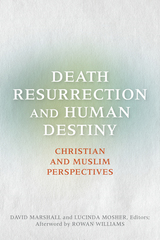
Death, Resurrection, and Human Destiny: Christian and Muslim Perspectives is a record of the 2012 Building Bridges seminar for leading Christian and Muslim scholars, convened by Rowan Williams, then Archbishop of Canterbury. The essays in this volume explore what the Bible and Qurān—and the Christian and Islamic theological traditions—have to say about death, resurrection, and human destiny. Special attention is given to the writings of al-Ghazali and Dante. Other essays explore the notion of the good death. Funeral practices of each tradition are explained. Relevant texts are included with commentary, as are personal reflections on death by several of the seminar participants. An account of the informal conversations at the seminar conveys a vivid sense of the lively, penetrating, but respectful dialogue which took place. Three short pieces by Rowan Williams provide his opening comments at the seminar and his reflections on its proceedings. The volume also contains an analysis of the Building Bridges Seminar after a decade of his leadership.
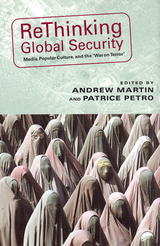
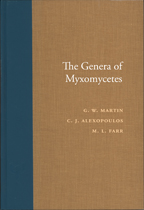
Critically examining past master narratives in light of emerging alternatives, these essayists ask us to reevaluate the stories we tell, the narrative traditions within which they are situated, and the audiences they are designed to persuade. The first essays explore the gendered character of social history rhetoric by exposing alternative, feminist traditions of social scientific and social historical writing. The second section focuses on alternative narrative traditions of historical writing in non-European contexts, specifically India, Japan, and China. And the third group spotlights the rhetorical uses of synthesis in the writings of social historians.
The essays feature the range of narrative possibilities available to historians who have become self-critical about the pervasive use of unexamined master narratives; they show how limited that tradition can be compared with the diverse alternatives derived from, for example, gendered traditions of Latin American travel writers of the nineteenth century, Victorian women's historical writing, or the lively subaltern tradition in Indian social history. Together they argue not for the abandonment of historical materialism or the elimination of all master narratives but for the reinvigoration of social history through the use of new and more persuasive arguments based on alternative narratives.

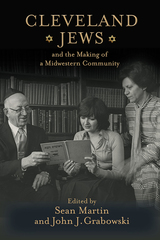
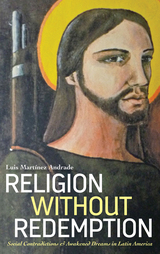
Martínez Andrade focuses on the central role of religion in the region and how it influences people’s interaction with changes in modern economics. Capitalism in Latin America, Martínez Andrade argues, has taken on religious characteristics, with places of worship—shopping malls and department stores—as well as its own prophets. This form of cultural religion is often contradictory in surprising ways: not only does it legitimate oppression, it can also be a powerful source of rebellion, unveiling a subversive side to the status quo. Religion Without Redemption advances the ideas of liberation theory, and challenges the provincialism to which many Latin American thinkers are usually consigned.
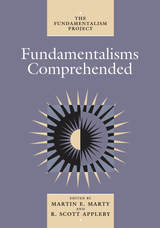
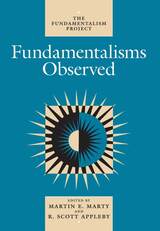
The contributors include sociologists, cultural anthropologists, and historians, some of whom have been participant-observers in the groups under consideration. As an analysis of the global resurgence of religion, Fundamentalisms Observed sheds new light on current religious movements and cultures from North America to the Far East.
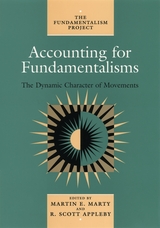
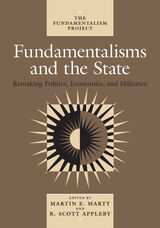
successful have they been in remaking political structures?
To answer this question, the contributors to this volume—
political scientists, historians of religion,
anthropologists, and sociologists—discuss the anti-
abortion movement, Operation Rescue in the United States, the
Islamic war of resistance in Afghanistan, Shi'ite
jurisprudence in Iran, and other issues. The volume
considers the effect that antisecular religious movements
have had over the past twenty-five years on national
economies, political parties, constitutional issues, and
international relations on five continents and within the
traditions of Islam, Christianity, Judaism, Buddhism,
Hinduism, and Sikhism. Marty and Appleby conclude with a
synthetic statement on the fundamentalist impact on polities,
economies, and state security.
The Fundamentalism Project, Volume 3
Martin E. Marty and R. Scott Appleby direct the
Fundamentalism Project. Marty, the Fairfax M. Cone
Distinguished Service Professor of the History of Modern
Christianity at the University of Chicago, is the senior
editor of the Christian Century and the author of
numerous books, including the multivolume Modern American
Religion, also published by the University of
Chicago Press. Appleby, a research associate at the
University of Chicago, is the author of “Church and
Age Unite!” The Modernist Impulse in American
Catholicism.
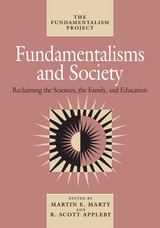
Edited by Martin E. Marty and R. Scott Appleby
Around the world, fundamentalist movements are profoundly
affecting the way we live. Misinformation and misperception
about fundamentalism exacerbate conflicts at home and abroad.
Yet policymakers, journalists, students, and others have
lacked any comprehensive resource on the explosive phenomenon
of fundamentalism. Now the Fundamentalism Project has
assembled an international team of scholars for a multivolume
assessment of the history, scope, sources, character, and
impact of fundamentalist movements within the world's major
religious traditions.
Fundamentalisms and Society shows how fundamentalist
movements have influenced human relations, education, women's
rights, and scientific research in over a dozen nations and
within the traditions of Islam, Judaism, Christianity,
Buddhism, and Hinduism. Drawn from the fields of
anthropology, sociology, history of religion, and history of
science, the contributors cover topics such as the
educational structures of Hindu revivalism, women in
fundamentalist Iran and Pakistan, and the creationist cosmos
of Protestant fundamentalism. In a concluding essay, William
H. McNeill situates contemporary fundamentalisms within a
world historical context.
The Fundamentalism Project, Volume 2
Martin E. Marty and R. Scott Appleby direct the
Fundamentalism Project. Marty, the Fairfax M. Cone
Distinguished Service Professor of the History of Modern
Christianity at the University of Chicago, is the senior
editor of the Christian Century and the author of
numerous books, including the multivolume Modern American
Religion, also published by the University of
Chicago Press. Appleby, a research associate at the
University of Chicago, is the author of “Church and
Age Unite!” The Modernist Impulse in American
Catholicism.

“In your country,” Ignacio Martín-Baró remarked to a North American colleague, “it’s publish or perish. In ours, it’s publish and perish.” In November 1989 a Salvadoran death squad extinguished his eloquent voice, raised so often and so passionately against oppression in his adopted country. A Spanish-born Jesuit priest trained in psychology at the University of Chicago, Martín-Baró devoted much of his career to making psychology speak to the community as well as to the individual. This collection of his writings, the first in English translation, clarifies Martín-Baró’s importance in Latin American psychology and reveals a major force in the field of social theory.
Gathering essays from an array of professional journals, this volume introduces readers to the questions and concerns that shaped Martín-Baró’s thinking over several decades: the psychological dimensions of political repression, the impact of violence and trauma on child development and mental health, the use of psychology for political ends, religion as a tool of ideology, and defining the “real” and the “normal” under conditions of state-sponsored violence and oppression, among others. Though grounded in the harsh realities of civil conflict in Central America, these essays have broad relevance in a world where political and social turmoil determines the conditions of daily life for so many. In them we encounter Martín-Baró’s humane, impassioned voice, reaffirming the essential connections among mental health, human rights, and the struggle against injustice. His analysis of contemporary social problems, and of the failure of the social sciences to address those problems, permits us to understand not only the substance of his contribution to social thought but also his lifelong commitment to the campesinos of El Salvador.
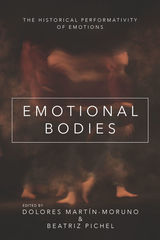
Contributors: Jon Arrizabalaga, Rob Boddice, Leticia Fernández-Fontecha, Emma Hutchison, Dolores Martín-Moruno, Piroska Nagy, Beatriz Pichel, María Rosón, Pilar León-Sanz, Bertrand Taithe, and Gian Marco Vidor.
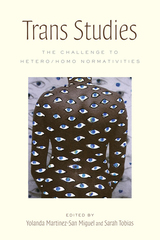
From Caitlyn Jenner to Laverne Cox, transgender people have rapidly gained public visibility, contesting many basic assumptions about what gender and embodiment mean. The vibrant discipline of Trans Studies explores such challenges in depth, building on the insights of queer and feminist theory to raise provocative questions about the relationships among gender, sexuality, and accepted social norms.
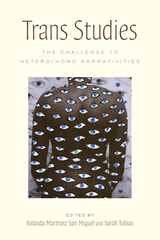
From Caitlyn Jenner to Laverne Cox, transgender people have rapidly gained public visibility, contesting many basic assumptions about what gender and embodiment mean. The vibrant discipline of Trans Studies explores such challenges in depth, building on the insights of queer and feminist theory to raise provocative questions about the relationships among gender, sexuality, and accepted social norms.

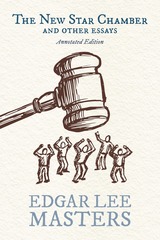
Coedited by noted Masters scholar, Jason Stacy, and his class, “Editing History,” this annotated edition of Edgar Lee Masters’s The New Star Chamber and Other Essays reappears at a perilous time in US history, when large corporations and overseas conflicts once again threaten the integrity of American rights and liberties, and the United States still finds itself beholden to corporate power and the legacy of imperial hubris. In speaking to his times, Masters also speaks to ours.
These thirteen essays lay bare the political ideology that informed Spoon River Anthology. Masters argues that the dangerous imperialism championed by then-President Theodore Roosevelt was rooted in the Constitution itself. By debating the ethics of the Philippine-American War, criticizing Hamiltonian centralization of government, and extolling the virtues of Jeffersonian individualism, Masters elucidates the ways in which America had strayed from its constitutional morals and from democracy itself. The result is a compelling critique of corporate capitalism and burgeoning American imperialism, as well as an exemplary source for understanding its complicated author in the midst of his transformation from urban lawyer to poet of rural America.
In print again for the first time since 1904, this edition includes an introduction and historical annotations throughout. Edited and annotated by students at Southern Illinois University Edwardsville, and designed and illustrated by students at Southern Illinois University Carbondale, this volume traces economic and political pathologies to the origins of the American republic. The New Star Chamber and Other Essays is as vital now as it was over 100 years ago.
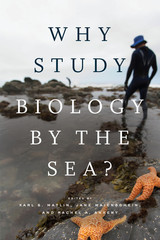
From the Stazione Zoologica in Naples to the Marine Biological Laboratory in Woods Hole, the Amoy Station in China, or the Misaki Station in Japan, students and researchers at seaside research stations have long visited the ocean to investigate life at all stages of development and to convene discussions of biological discoveries. Exploring the history and current reasons for study by the sea, this book examines key people, institutions, research projects, organisms selected for study, and competing theories and interpretations of discoveries, and it considers different ways of understanding research, such as through research repertoires. A celebration of coastal marine research, Why Study Biology by the Sea? reveals why scientists have moved from the beach to the lab bench and back.
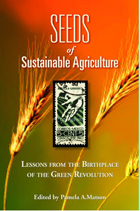
The Yaqui Valley is the birthplace of the Green Revolution and one of the most intensive agricultural regions of the world, using irrigation, fertilizers, and other technologies to produce some of the highest yields of wheat anywhere. It also faces resource limitations, threats to human health, and rapidly changing economic conditions. In short, the Yaqui Valley represents the challenge of modern agriculture: how to maintain livelihoods and increase food production while protecting the environment.
Renowned scientist Pamela Matson and colleagues from leading institutions in the U.S. and Mexico spent fifteen years in the Yaqui Valley in Sonora, Mexico addressing this challenge. Seeds of Sustainability represents the culmination of their research, providing unparalleled information about the causes and consequences of current agricultural methods. Even more importantly, it shows how knowledge can translate into better practices, not just in the Yaqui Valley, but throughout the world.
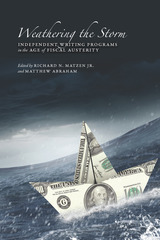
Leading writing specialists at the University of Texas at Austin, Syracuse University, the University of Minnesota, and many other institutions document and think carefully about the on-the-ground obstacles that have made the creation of IWPs unique. From institutional naysayers in English departments to skeptical administrators, IWPs and the faculty within them have surmounted not only negative economics but also negative rhetorics. This collection charts the story of this journey as writing faculty continually make the case for the importance of writing in the university curriculum.
Independence has, for the most part, allowed IWPs to better respond to the Great Recession, but to do so they have had to define writing studies in relation to other disciplines and departments. Weathering the Storm will be of great interest to faculty and graduate students in rhetoric and composition, writing program administrators, and writing studies and English department faculty.
Contributors: Linda Adler-Kassner, Lois Agnew, Alice Batt, David Beard, Davida Charney, Amy Clements, Diane Davis, Frank Gaughan, Heidi Skurat Harris, George H. Jensen, Rodger LeGrand, Drew M. Loewe, Mark Garrett Longaker, Cindy Moore, Peggy O’Neill, Chongwon Park, Louise Wetherbee Phelps, Mary Rist, Valerie Ross, John J Ruszkiewicz, Eileen E. Schell, Madeleine Sorapure, Chris Thaiss, Patrick Wehner, Jamie White-Farnham, Carl Whithaus, Traci A. Zimmerman
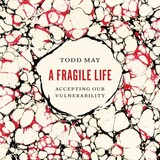
This is an auto-narrated audiobook edition of this book.
May starts with a simple but hard truth: suffering is inevitable. At the most basic level, we suffer physically—a sprained ankle or a bad back. But we also suffer insults and indifference. We suffer from overburdened schedules and unforeseen circumstances, from moral dilemmas and emotional heartaches. Even just thinking about our own mortality—the fact that we only live one life—can lead us to tremendous suffering. No wonder philosophies such as Buddhism, Taosim, Stoicism, and even Epicureanism—all of which counsel us to rise above these plights—have had appeal over the centuries. May highlights the tremendous value of these philosophies and the ways they can guide us toward better lives, but he also exposes a major drawback to their tenets: such invulnerability is too emotionally disengaged from the world, leading us to place too great a distance between ourselves and our experience. Rather than seeking absolute immunity, he argues most of us just want to hurt less and learn how to embrace and accept what suffering we do endure in a meaningful way.
Offering a guide on how to positively engage suffering, May ultimately lays out a new way of thinking about how we exist in the world, one that reassures us that our suffering, rather than a failure of physical or psychological resilience, is a powerful and essential part of life itself.
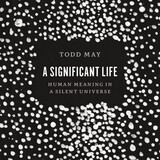
This is an auto-narrated audiobook edition of this book.
What makes for a good life, or a beautiful one, or, perhaps most important, a meaningful one? Throughout history most of us have looked to our faith, our relationships, or our deeds for the answer. But in A Significant Life, philosopher Todd May offers an exhilarating new way of thinking about these questions, one deeply attuned to life as it actually is: a work in progress, a journey—and often a narrative. Offering moving accounts of his own life and memories alongside rich engagements with philosophers from Aristotle to Heidegger, he shows us where to find the significance of our lives: in the way we live them.
May starts by looking at the fundamental fact that life unfolds over time, and as it does so, it begins to develop certain qualities, certain themes. Our lives can be marked by intensity, curiosity, perseverance, or many other qualities that become guiding narrative values. These values lend meanings to our lives that are distinct from—but also interact with—the universal values we are taught to cultivate, such as goodness or happiness. Offering a fascinating examination of a broad range of figures—from music icon Jimi Hendrix to civil rights leader Fannie Lou Hamer, from cyclist Lance Armstrong to The Portrait of a Lady’s Ralph Touchett to Claus von Stauffenberg, a German officer who tried to assassinate Hitler—May shows that narrative values offer a rich variety of criteria by which to assess a life, specific to each of us and yet widely available. They offer us a way of reading ourselves, who we are, and who we might like to be.
Clearly and eloquently written, A Significant Life is a recognition and a comfort, a celebration of the deeply human narrative impulse by which we make—even if we don’t realize it—meaning for ourselves. It offers a refreshing way to think of an age-old question, of quite simply, what makes a life worth living.
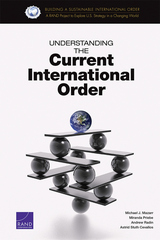
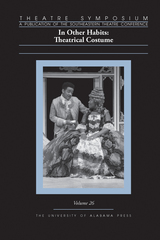
Stage costumes reveal character. They tell audiences who the character is or how a character functions within the world of the play, among other things. Theatrical costuming, however, along with other forms of theatre design, has often been considered merely a craft, rather than part of the deeply systemic creation of meaning onstage. In what ways do our clothes shape and reveal our habits of behavior? How do stage costumes work to reveal one kind of habit via the manipulation of another? How might theatre practitioners learn to most effectively exploit this dynamic? Theatre Symposium, Volume 26 analyzes the ways in which meaning is conveyed through costuming for the stage and explores the underlying assumptions embedded in theatrical practice and costume production.
THEATRE SYMPOSIUM, VOLUME 26
MICHELE MAJER
Plus que Reine: The Napoleonic Revival in Belle Epoque Theatre and Fashion
CAITLIN QUINN
Creating a Realistic Rendering Pedagogy: The Fashion Illustration Problem
ALY RENEE AMIDEI
Where'd I Put My Character?: The Costume Character Body and Essential Costuming for the Ensemble Actor
KYLA KAZUSCHYK
Embracing the Chaos: Creating Costumes for Devised Work
DAVID S. THOMPSON
Dressing the Image: Costumes in Printed Theatrical Advertising
LEAH LOWE
Costuming the Audience: Gentility, Consumption, and the Lady’s Theatre Hat in Gilded Age America
JORGE SANDOVAL
The RuPaul Effect: The Exploration of the Costuming Rituals of Drag Culture in Social Media and the Theatrical Performativity of the Male Body in the Ambit of the Everyday
GREGORY S. CARR
A Brand New Day on Broadway: The Genius of Geoffrey Holder’s Artistry and His Intentional Evocation of the African Diaspora
ANDREW GIBB
On the [Historical] Sublime: J. R. Planché’s King John and the Romantic Ideal of the Past
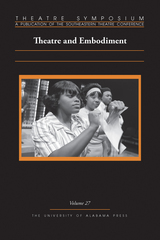
Theatre is inescapably about bodies. By definition, theatre requires the live bodies of performers in the same space and at the same time as the live bodies of an audience. And, yet, it’s hard to talk about bodies. We talk about characters; we talk about actors; we talk about costume and movement. But we often approach these as identities or processes layered onto bodies, rather than as inescapably entwined with them. Bodies on the theatrical stage hold the power of transformation. Theatre practitioners, scholars, and educators must think about what bodies go where onstage and what stories which bodies to tell.
The essays in Theatre Symposium, Volume 27 explore a broad range of issues related to embodiment. The volume begins with Rhonda Blair’s keynote essay, in which she provides an overview of the current cognitive science underpinning our understanding of what it means to be “embodied” and to talk about “embodiment.” She also provides a set of goals and cautions for theatre artists engaging with the available science on embodiment, while issuing a call for the absolute necessity for that engagement, given the primacy of the body to the theatrical act.
The following three essays provide examinations of historical bodies in performance. Timothy Pyles works to shift the common textual focus of Racinian scholarship to a more embodied understanding through his examination of the performances of the young female students of the Saint-Cyr academy in two of Racine’s Biblical plays. Shifting forward in time by three centuries, Travis Stern’s exploration of the auratic celebrity of baseball player Mike Kelly uncovers the ways in which bodies may retain the ghosts of their former selves long after physical ability and wealth are gone. Laurence D. Smith’s investigation of actress Manda Björling’s performances in Miss Julie provides a model for how cognitive science, in this case theories of cognitive blending, can be integrated with archival theatrical research and scholarship.
From scholarship grounded in analysis of historical bodies and embodiment, the volume shifts to pedagogical concerns. Kaja Amado Dunn’s essay on the ways in which careless selection of working texts can inflict embodied harm on students of color issues an imperative call for careful and intentional classroom practice in theatre training programs. Cohen Ambrose’s theorization of pedagogical cognitive ecologies, in which subjects usually taught disparately (acting, theatre history, costume design, for example) could be approached collaboratively and through embodiment, speaks to ways in which this call might be answered.
Tessa Carr’s essay on "The Integration of Tuskegee High School" brings together ideas of historical bodies and embodiment in the academic theatrical context through an examination of the process of creating a documentary theatre production. The final piece in the volume, Bridget Sundin’s exchange with the ghost of Marlene Dietrich, is an imaginative exploration of how it is possible to open the archive, to create new spaces for performance scholarship, via an interaction with the body.

The just peace movement offers a critical shift in focus and imagination. Recognizing that all life is sacred and seeking peace through violence is unsustainable, the just peace approach turns our attention to rehumanization, participatory processes, nonviolent resistance, restorative justice, reconciliation, racial justice, and creative strategies of active nonviolence to build sustainable peace, transform conflict, and end cycles of violence. A Just Peace Ethic Primer illuminates a moral framework behind this praxis and proves its versatility in global contexts.
With essays by a diverse group of scholars, A Just Peace Ethic Primer outlines the ethical, theological, and activist underpinnings of a just peace ethic.These essays also demonstrate and revise the norms of a just peace ethic through conflict cases involving US immigration, racial and environmental justice, and the death penalty, as well as gang violence in El Salvador, civil war in South Sudan, ISIS in Iraq, gender-based violence in the Democratic Republic of Congo, women-led activism in the Philippines, and ethnic violence in Kenya.
A Just Peace Ethic Primer exemplifies the ecumenical, interfaith, and multicultural aspects of a nonviolent approach to preventing and transforming violent conflict. Scholars, advocates, and activists working in politics, history, international law, philosophy, theology, and conflict resolution will find this resource vital for providing a fruitful framework and implementing a creative vision of sustainable peace.
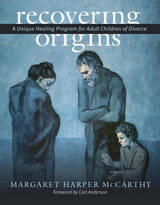
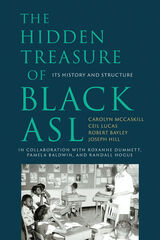
Black ASL has long been recognized as a distinct variety of American Sign Language based on abundant anecdotal evidence. The Hidden Treasure of Black ASL, originally published in 2011, presents the first sociohistorical and linguistic study of this language variety. Based on the findings of the Black ASL Project, which undertook this unprecedented research, Hidden Treasure documents the stories and language of the African American Deaf community. With links to online supplemental video content that includes interviews with Black ASL users (formerly on DVD), this volume is a groundbreaking scholarly contribution and a powerful affirmation for Black Deaf people.
This paperback edition includes an updated foreword by Glenn B. Anderson, a new preface that reflects on the impact of this research, and an expanded list of references and resources on Black ASL.
The supplemental video content is available online at the Gallaudet University Press YouTube Channel. Under Playlists, click “The Hidden Treasure of Black ASL: Companion Video to the Book.” The original Black ASL Project research videos are also available.
Featured in the film Signing Black in America: The Story of Black ASL, produced by The Language and Life Project at North Carolina State University (Dr. Walt Wolfram, Executive Producer). Look for it on PBS.
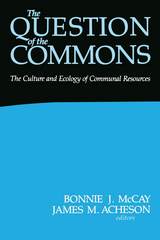
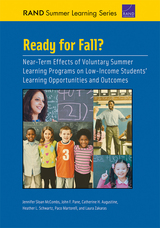
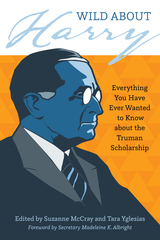
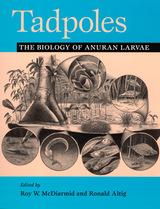
In this indispensable reference, leading experts on tadpole biology relate what we currently know about tadpoles and what we might learn from them in the future. Tadpoles provides detailed summaries of tadpole morphology, development, behavior, ecology, and environmental physiology; explores the evolutionary consequences of the tadpole stage; synthesizes available information on their biodiversity; and presents a standardized terminology and an exhaustive literature review of tadpole biology.
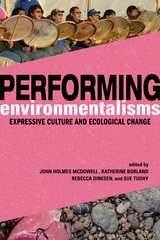
Interdisciplinary in approach and wide-ranging in scope, Performing Environmentalisms is an engaging look at the merger of cultural expression and environmental action on the front lines of today's global emergency.
Contributors: Aaron S. Allen, Eduardo S. Brondizio, Assefa Tefera Dibaba, Rebecca Dirksen, Mary Hufford, John Holmes McDowell, Mark Pedelty, Jennifer C. Post, Chie Sakakibara, Jeff Todd Titon, Rory Turner, Lois Wilcken
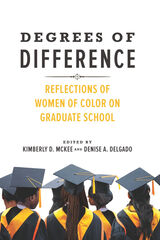
In Degrees of Difference, women of color from diverse backgrounds give frank, unapologetic accounts of their battles—both internal and external—to navigate grad school and fulfill their ambitions. At the same time, the authors offer strategies for surviving the grind via stories of their own hard-won successes with self-care, building supportive communities, finding like-minded mentors, and resisting racism and unsupportive faculty and colleagues.
Contributors: Aeriel A. Ashlee, Denise A. Delgado, Nwadiogo I. Ejiogu, Delia Fernández, Regina Emily Idoate, Karen J. Leong, Kimberly D. McKee, Délice Mugabo, Carrie Sampson, Arianna Taboada, Jenny Heijun Wills, and Soha Youssef
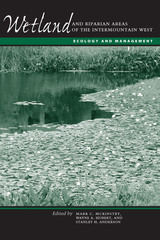
Wetlands and riparian areas between the Rocky Mountains and the Sierra Nevada are incredibly diverse and valuable habitats. More than 80 percent of the wildlife species in this intermountain region depend on these wetlands—which account for less than 2 percent of the land area—for their survival. At the same time, the wetlands also serve the water needs of ranchers and farmers, recreationists, vacation communities, and cities. It is no exaggeration to call water the "liquid gold" of the West, and the burgeoning human demands on this scarce resource make it imperative to understand and properly manage the wetlands and riverine areas of the Intermountain West.
This book offers land managers, biologists, and research scientists a state-of-the-art survey of the ecology and management practices of wetland and riparian areas in the Intermountain West. Twelve articles examine such diverse issues as laws and regulations affecting these habitats, the unique physiographic features of the region, the importance of wetlands and riparian areas to fish, wildlife, and livestock, the ecological function of these areas, their value to humans, and the methods to evaluate these habitats. The authors also address the human impacts on the land from urban and suburban development, mining, grazing, energy extraction, recreation, water diversions, and timber harvesting and suggest ways to mitigate such impacts.

Covering 3,100 miles over a period of some 20 days at a laborious average speed of 6.5 knots or less, the attack submarine carefully threaded its way through innumerable underwater canyons of ice and over irregular seafloors, at one point becoming entrapped in an “ice garage.” Only cool thinking and skillful maneuvering of the nearly 5,000-ton vessel enabled a successful exit.
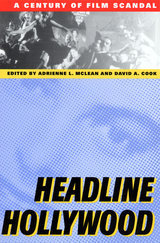
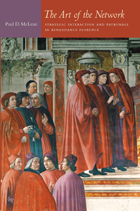
McLean scrutinized thousands of letters to and from Renaissance Florentines. He describes the social protocols the letters reveal, paying particular attention to the means by which Florentines crafted credible presentations of themselves. The letters, McLean contends, testify to the development not only of new forms of self-presentation but also of a new kind of self to be presented: an emergent, “modern” conception of self as an autonomous agent. They also bring to the fore the importance that their writers attached to concepts of honor, and the ways that they perceived themselves in relation to the Florentine state.
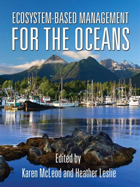
At its core, ecosystem-based management (EBM) is about acknowledging connections. Instead of focusing on the impacts of single activities on the delivery of individual ecosystem services, EBM focuses on the array of services that we receive from marine systems, the interactive and cumulative effects of multiple human activities on these coupled ecological and social systems, and the importance of working towards common goals across sectors. Ecosystem-Based Management for the Oceans provides a conceptual framework for students and professionals who want to understand and utilize this powerful approach. And it employs case studies that draw on the experiences of EBM practitioners to demonstrate how EBM principles can be applied to real-world problems.
The book emphasizes the importance of understanding the factors that contribute to social and ecological resilience —the extent to which a system can maintain its structure, function, and identity in the face of disturbance. Utilizing the resilience framework, professionals can better predict how systems will respond to a variety of disturbances, as well as to a range of management alternatives. Ecosystem-Based Management for the Oceans presents the latest science of resilience, while it provides tools for the design and implementation of responsive EBM solutions.
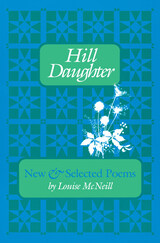
Musically complex and intellectually sophisticated, Louise McNeill’s imagery and rhythms have their deepest sources in the West Virginia mountains where she was born in 1911 on a farm that has been in her family for nine generations. These are rooted poems, passionately concerned with stewardship of the land and with the various destructions of land and people that often come masked as “progress.”
In colloquial, rural, and sometimes macabre imagery, Louise McNeill documents the effects of the change from a farm to an industrial economy on the West Virginia mountain people. She writes of the earliest white settlements on the western side of the Alleghenies and of the people who remained there through the coming of the roads, the timber and coal industries, and the several wars of this century.
The reappearance of Louise McNeill’s long out-of-print poems will be cause for celebration for readers familiar with her work. Those reading it for the first time will discover musical, serious, idiosyncratic, and startling poems that define the Appalachian experience.
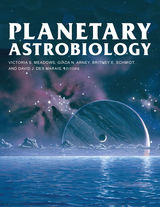
Planetary Astrobiology represents the combined efforts of more than seventy-five international experts consolidated into twenty chapters and provides an accessible, interdisciplinary gateway for new students and seasoned researchers who wish to learn more about this expanding field. Readers are brought to the frontiers of knowledge in astrobiology via results from the exploration of our own solar system and exoplanetary systems. The overarching goal of Planetary Astrobiology is to enhance and broaden the development of an interdisciplinary approach across the astrobiology, planetary science, and exoplanet communities, enabling a new era of comparative planetology that encompasses conditions and processes for the emergence, evolution, and detection of life.
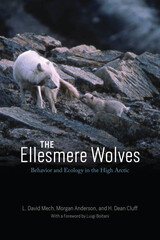
For parts of twenty-four summers, wolf biologist L. David Mech lived with a group of wolves on Ellesmere Island, some six hundred miles from the North Pole. Elsewhere, most wolves flee from even the scent of humans, but these animals, evolving relatively free from human persecution, are unafraid. Having already spent twenty-eight years studying other populations of wolves more remotely by aircraft, snow-tracking, live-trapping, and radio-tracking, Mech was primed to join their activities up close and record their interactions with each other. This book tells the remarkable story of what Mech—and the researchers who followed him—have learned while living among the wolves.
The Ellesmere wolves were so unconcerned with Mech’s presence that they allowed him to camp near their den and to sit on his all-terrain vehicle as he observed them, watching packs as large as seven adults and six pups go about their normal activities. In these extraordinarily close quarters, a pup untying his bootlace or an adult sniffing his gloved hand was just part of daily life. Mech accompanied the wolves on their travels and watched as they hunted muskoxen and arctic hares. By achieving the same kind of intimacy with his wild hosts’ every action that we might experience living with domesticated dogs, Mech gained new insights into common but rarely studied behaviors like pup feeding, food caching, howling, and scent-marking. After Mech’s time at Ellesmere ended, his coauthors and fellow wolf researchers Morgan Anderson and H. Dean Cluff spent parts of four summers studying the wolves via radio collars, further illuminating the creatures’ movements and ecology. This book synthesizes their findings, offering both a compelling scientific overview of the animals’ behavior—from hunting to living in packs to rearing pups—and a tale of adventure and survival in the Arctic.
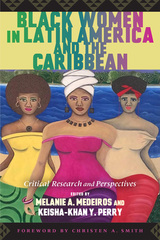


While the field of public management has become increasingly international, research and policy recommendations that work for one country often do not work for another. Why, for example, is managerial networking important in the United States, moderately effective in the United Kingdom, and of little consequence in the Netherlands? Comparative Public Management argues that scholars must find a better way to account for political, environmental, and organizational contexts to build a more general model of public management. The volume editors propose a framework in which context influences the types of managerial actions that can be used effectively in public organizations.
After introducing the innovative framework, the book offers seven empirical chapters—cases from seven countries and a range of policy areas (health, education, taxation, and local governance)—that show how management affects performance in different contexts. Following these empirical tests, the book examines themes that emerge across cases and seeks to set an agenda for future research. Intended for students and scholars of public administration and public policy, this book will be the first to provide a comprehensive comparative assessment of management’s impact on organizational performance.
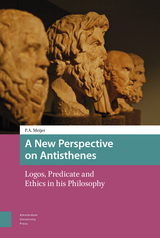

A comprehensive and accessible guide to learning and successfully applying QCA
Social phenomena can rarely be attributed to single causes—instead, they typically stem from a myriad of interwoven factors that are often difficult to untangle. Drawing on set theory and the language of necessary and sufficient conditions, qualitative comparative analysis (QCA) is ideally suited to capturing this causal complexity. A case-based research method, QCA regards cases as combinations of conditions and compares the conditions of each case in a structured way to identify the necessary and sufficient conditions for an outcome.
Qualitative Comparative Analysis: An Introduction to Research Design and Application is a comprehensive guide to QCA. As QCA becomes increasingly popular across the social sciences, this textbook teaches students, scholars, and self-learners the fundamentals of the method, research design, interpretation of results, and how to communicate findings.
Following an ideal typical research cycle, the book’s ten chapters cover the methodological basis and analytical routine of QCA, as well as matters of research design, causation and causal complexity, QCA variants, and the method’s reception in the social sciences. A comprehensive glossary helps to clarify the meaning of frequently used terms. The book is complemented by an accessible online R manual to help new users to practice QCA’s analytical steps on sample data and then implement with their own findings. This hands-on textbook is an essential resource for students and researchers looking for a complete and up-to-date introduction to QCA.

A collection of ancient Byzantine hymns featuring women as pivotal characters, now in a new translation.
At a time when Christianity was becoming the dominant religion in the Byzantine Roman Empire, Romanos the Melodist (ca. 485–565) was a composer of songs for festivals and rituals in late antique Constantinople. Most of his songs include dramatic dialogues or monologues woven with imagery from ordinary life, and his name became inseparably tied to the kontakion, a genre of dramatic hymn. Later Byzantine religious poets enthusiastically praised his creative virtuosity and a legend claimed that Romanos’s inspiration came directly from the Virgin Mary herself.
Songs about Women contains eighteen works related to the liturgical calendar that feature important female characters, many portrayed as models for Christian life. They appear as heroines and villains, saints and sinners, often as transgressive and bold. Romanos’s songs offer intriguing perspectives on gender ideals and women’s roles in the early Byzantine world.
This edition presents a new translation of the Byzantine Greek texts into English.

The master of New Comedy.
Menander (?344/3–292/1 BC) of Athens, the leading playwright of the New Comedy, wrote more than 100 plays. Many of his comedies were adapted by Roman dramatists. By the middle ages, however, his works were lost. Then, at the end of the nineteenth century, papyrus texts, preserved from antiquity by the dry heat of Egypt, began to be discovered. These have yielded so far one play virtually complete (Dyskolos), large continuous portions of four more (Aspis, Epitrepontes, Perikeiromene, Samia), and sizable chunks of many others. Menander remains a paradox: artificial plots based on unlikely but conventional coincidences, enlivened by individualized characters, realistic situations, and at times deeply moving dialogue.
Volume I of Geoffrey Arnott’s three-volume edition of Menander contains six plays, including Dyskolos (The Peevish Fellow), which won first prize in Athens in 317 BC, and Dis Exapaton (Twice a Swindler), the original of Plautus’ Two Bacchises. Ten plays are in Volume II, among them the recently published fragments of Misoumenos (The Man She Hated), which sympathetically presents the flawed relationship of a soldier and a captive girl; and the surviving half of Perikeiromene (The Girl with Her Hair Cut Short), a comedy of mistaken identity and lovers’ quarrel. Volume III begins with Samia (The Woman from Samos), which has come down to us nearly complete. Here too are the very substantial extant portions of Sikyonioi (The Sicyonians) and Phasma (The Apparition), as well as Synaristosai (Women Lunching Together), on which Plautus’ Cistellaria was based.

The master of New Comedy.
Menander (?344/3–292/1 BC) of Athens, the leading playwright of the New Comedy, wrote more than 100 plays. Many of his comedies were adapted by Roman dramatists. By the middle ages, however, his works were lost. Then, at the end of the nineteenth century, papyrus texts, preserved from antiquity by the dry heat of Egypt, began to be discovered. These have yielded so far one play virtually complete (Dyskolos), large continuous portions of four more (Aspis, Epitrepontes, Perikeiromene, Samia), and sizable chunks of many others. Menander remains a paradox: artificial plots based on unlikely but conventional coincidences, enlivened by individualized characters, realistic situations, and at times deeply moving dialogue.
Volume I of Geoffrey Arnott’s three-volume edition of Menander contains six plays, including Dyskolos (The Peevish Fellow), which won first prize in Athens in 317 BC, and Dis Exapaton (Twice a Swindler), the original of Plautus’ Two Bacchises. Ten plays are in Volume II, among them the recently published fragments of Misoumenos (The Man She Hated), which sympathetically presents the flawed relationship of a soldier and a captive girl; and the surviving half of Perikeiromene (The Girl with Her Hair Cut Short), a comedy of mistaken identity and lovers’ quarrel. Volume III begins with Samia (The Woman from Samos), which has come down to us nearly complete. Here too are the very substantial extant portions of Sikyonioi (The Sicyonians) and Phasma (The Apparition), as well as Synaristosai (Women Lunching Together), on which Plautus’ Cistellaria was based.

The master of New Comedy.
Menander (?344/3–292/1 BC) of Athens, the leading playwright of the New Comedy, wrote more than 100 plays. Many of his comedies were adapted by Roman dramatists. By the middle ages, however, his works were lost. Then, at the end of the nineteenth century, papyrus texts, preserved from antiquity by the dry heat of Egypt, began to be discovered. These have yielded so far one play virtually complete (Dyskolos), large continuous portions of four more (Aspis, Epitrepontes, Perikeiromene, Samia), and sizable chunks of many others. Menander remains a paradox: artificial plots based on unlikely but conventional coincidences, enlivened by individualized characters, realistic situations, and at times deeply moving dialogue.
Volume I of Geoffrey Arnott’s three-volume edition of Menander contains six plays, including Dyskolos (The Peevish Fellow), which won first prize in Athens in 317 BC, and Dis Exapaton (Twice a Swindler), the original of Plautus’ Two Bacchises. Ten plays are in Volume II, among them the recently published fragments of Misoumenos (The Man She Hated), which sympathetically presents the flawed relationship of a soldier and a captive girl; and the surviving half of Perikeiromene (The Girl with Her Hair Cut Short), a comedy of mistaken identity and lovers’ quarrel. Volume III begins with Samia (The Woman from Samos), which has come down to us nearly complete. Here too are the very substantial extant portions of Sikyonioi (The Sicyonians) and Phasma (The Apparition), as well as Synaristosai (Women Lunching Together), on which Plautus’ Cistellaria was based.
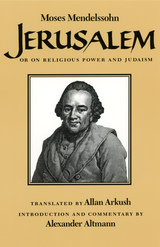

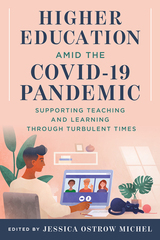
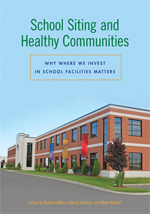
In recent decades, many metropolitan areas in the United States have experienced a decline in the population of urban centers and rapid growth in the suburbs, with new schools being built outside of cities and existing urban schools facing closure. These new schools are increasingly larger and farther from residences; in contrast, urban school facilities are often in closer proximity to homes but are also in dire need of upgrading or modernization. This eye-opening book explores the compelling health and economic rationales for new approaches to school siting, including economic savings to school districts, transportation infrastructure needs, and improved child health. An essential examination of public policy issues associated with school siting, this compiled volume will assist policy makers and help the public understand why it is important for government and school districts to work together on school siting and capital expenditures and how these new outlooks will improve local and regional outcomes.

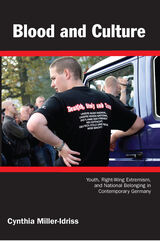
Miller-Idriss describes a new understanding of national belonging emerging among young Germans—one in which cultural assimilation takes precedence over blood or ethnic heritage. Moreover, she argues that teachers’ well-intentioned, state-sanctioned efforts to counter nationalist pride often create a backlash, making radical right-wing groups more appealing to their students. Miller-Idriss argues that the state’s efforts to shape national identity are always tempered and potentially transformed as each generation reacts to the official conception of what the nation “ought” to be.
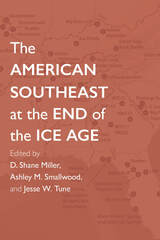
The 1996 benchmark volume The Paleoindian and Early Archaic Southeast, edited by David G. Anderson and Kenneth E. Sassaman, was the first study to summarize what was known of the peoples who lived in the Southeast when ice sheets covered the northern part of the continent and mammals such as mammoths, saber-toothed cats, and ground sloths roamed the landscape.
The American Southeast at the End of the Ice Age provides an updated, definitive synthesis of current archaeological research gleaned from an array of experts in the region. It is organized in three parts: state records, the regional perspective, and reflections and future directions. Chapters survey a diversity of topics including the distribution of the earliest archaeological sites in the region, chipped-stone tool technology, the expanding role of submerged archaeology, hunter-gatherer lifeways, past climate changes and the extinction of megafauna on the transitional landscape, and evidence of demographic changes at the end of the Ice Age. Discussion of the ethical responsibilities regarding the use of private collections and the relationship of archaeologists and the avocational community, insight from outside the Southeast, and considerations for future research round out the volume.

The contributors assembled here, leading exponents of contemporary critical methods as well as close students of Blake, argue the grounds, purposes, and validity of each approach and then apply its method in detailed readings of Blake's works. We see deconstruction, psychoanalytic interpretation, feminist critique, semiotic analysis, Marxist criticism, revisionism, and other methods brought to bear on Blake's texts and into confrontation with one another by those best able to do so.
Through the essays themselves and in the reaction they will certainly provoke, Critical Paths will bring increased theoretical awareness to the study of Blake and will further the ongoing redefinition of Blake's art. At the same time, the collection investigates the general problem of methodology in literary studies by means of a casebook examination of modern critical approaches. Blake criticism and current literary theory here come together; the encounter illuminates and enriches both.
READERS
Browse our collection.
PUBLISHERS
See BiblioVault's publisher services.
STUDENT SERVICES
Files for college accessibility offices.
UChicago Accessibility Resources
home | accessibility | search | about | contact us
BiblioVault ® 2001 - 2024
The University of Chicago Press





